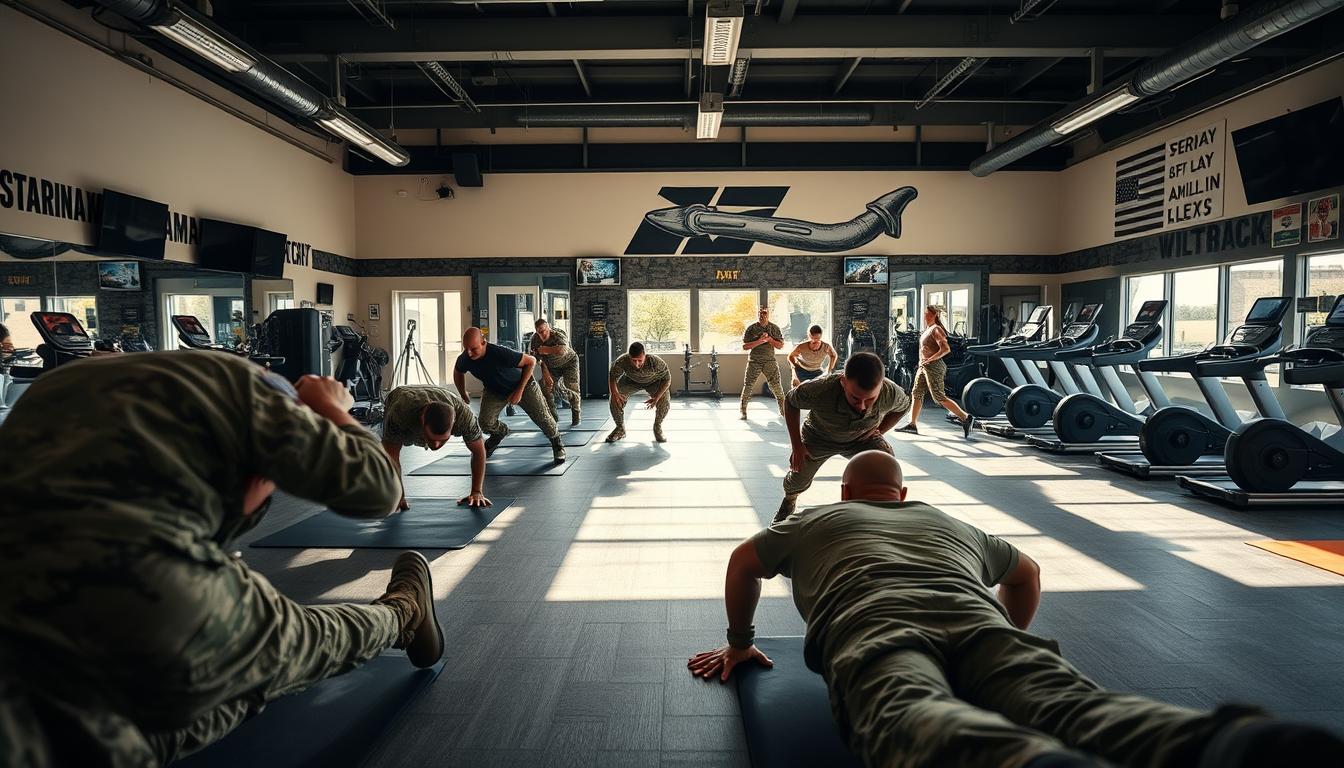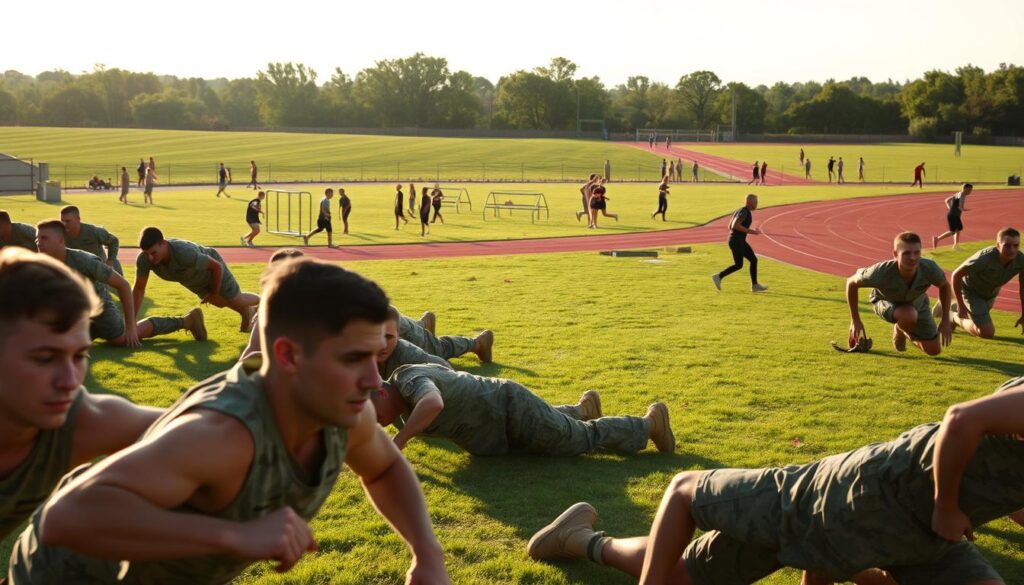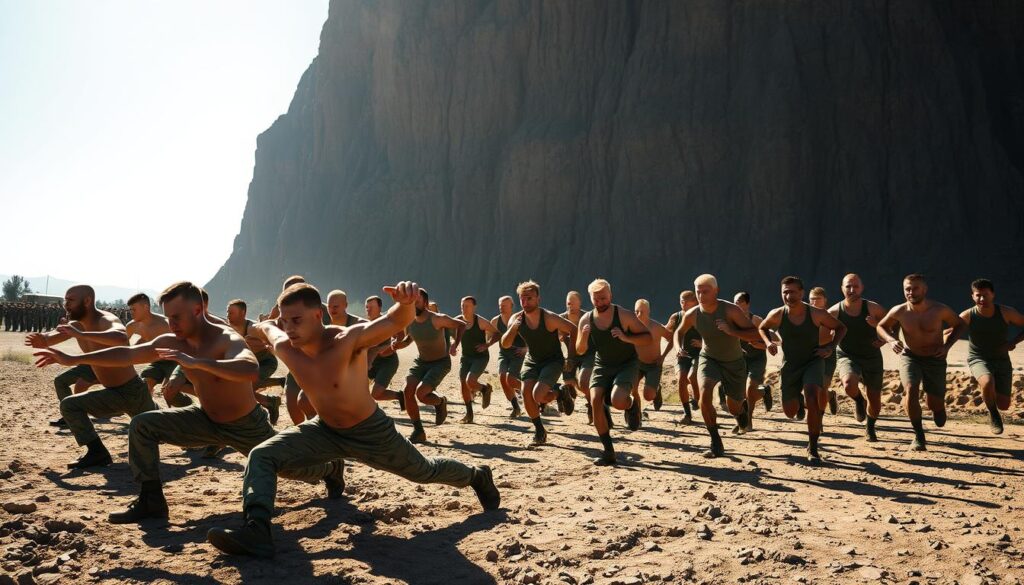Are you ready to serve your country? Wondering if you’re physically ready for military life? The path to becoming a soldier is tough, both in mind and body.
Preparing ahead of time is crucial. The Future Soldier Preparatory Course helps recruits get ready. It focuses on both learning and staying fit.
This course is a big step in getting recruits ready for boot camp. By working on military fitness programs, people can boost their chances of doing well.
Key Takeaways
- The Future Soldier Preparatory Course is designed to help recruits meet the Army’s enlistment standards.
- Physical fitness is a critical component of military preparation.
- A well-structured pre-boot camp workout can significantly improve a recruit’s performance.
- The course aims to bridge the gap between current fitness levels and the demands of military training.
- Early preparation is key to a successful military career.
Understanding Army Pre-Boot Camp Fitness Standards
Starting your journey to become a soldier means knowing the Army’s fitness standards before boot camp. It’s key to understand the physical and mental challenges ahead.
Physical Fitness Requirements
The Army checks your strength, endurance, and agility. The Army Fitness Test (AFT) has five parts. These include deadlifts, push-ups, sprinting, planks, and a two-mile run. Each part tests different aspects of fitness.
Mental Readiness
Mental toughness is as important as physical fitness. You need to show resilience when faced with challenges. This isn’t measured by numbers but by how you perform and act during training.
Assessment Methods
The AFT is a key tool to check your fitness. It pushes you to see how ready you are for military training. It’s a tough test that assesses your overall fitness.
| AFT Event | Description | Minimum Passing Score | Maximum Score |
|---|---|---|---|
| 3 Repetition Maximum Deadlift | Measures strength by lifting a maximum weight 3 times | 140 lbs | 340 lbs |
| Hand-Release Push-Up | Assesses upper body strength and endurance | 20 reps | 71 reps |
| Sprint-Drag-Carry | Evaluates agility, strength, and endurance through a series of tasks | 2:04 min | 1:30 min |
| Plank | Measures core strength and endurance | 1:30 min | 4:22 min |
| Two-Mile Run | Assesses cardiovascular endurance | 18:30 min | 10:30 min |
To prepare for the AFT, focus on these events and know the scores. Regular training can boost your performance. For more on soldier stats, visit Army Height Calculator.
Essential Components of a Pre-Boot Camp Training Plan
To succeed in boot camp, a good training plan is key. It should include cardio, strength, and flexibility exercises. This mix helps recruits build the endurance and strength needed for boot camp’s tough environment.
Cardio Conditioning
Cardiovascular endurance is crucial for recruits. It lets them do daily tasks and handle the physical demands of training. Good cardio exercises are:
- Running
- Swimming
- Cycling
- High-Intensity Interval Training (HIIT)
Recruits should do cardio exercises 3 times a week. They should increase the intensity and duration over time.
Strength Training Essentials
Strength is vital for recruits to do tasks that need lifting and moving. A good strength training routine includes:
- Squats
- Push-ups
- Lunges
- Deadlifts
Strength training should happen at least 2 times a week. Focus on different muscle groups each session.
Flexibility and Mobility
Flexibility and mobility exercises prevent injuries and improve performance. Recruits should do:
- Stretching exercises
- Yoga
- Dynamic mobility drills
Do these exercises regularly, especially after cardio or strength training.
A sample weekly training plan might look like this:
| Day | Cardio | Strength Training | Flexibility/Mobility |
|---|---|---|---|
| Monday | 30 minutes running | Squats, Push-ups | Stretching |
| Tuesday | HIIT | Lunges, Deadlifts | Yoga |
| Wednesday | Rest | Rest | Mobility drills |
| Thursday | Cycling | Upper body | Stretching |
| Friday | Swimming | Lower body | Yoga |
By adding these essential components to a pre-boot camp plan, recruits can boost their fitness. This makes them ready for boot camp’s challenges.
Designing Your Own Pre-Boot Camp Workouts
A good pre-boot camp workout plan boosts your fitness and gets you ready. Knowing what makes a workout effective is key.
Creating a Daily Routine
Starting a daily routine is the first step to a great pre-boot camp workout plan. It means setting time for cardio exercises, strength training, and flexibility workouts. Being consistent is how you get better.
For example, begin with a 30-minute cardio session. Then, do strength training, and finish with flexibility exercises. Here’s a daily routine example:
- Monday: Cardio and upper body strength training
- Tuesday: Lower body strength training and flexibility
- Wednesday: Rest day
- Thursday: Cardio and core strength training
- Friday: Upper body strength training and flexibility
- Saturday: Cardio and lower body strength training
- Sunday: Rest day or active recovery
Sample Workout Plans
Having a sample workout plan helps you create your own. Here’s an example of a pre-boot camp workout plan:
| Day | Workout Type | Exercises | Sets/Reps |
|---|---|---|---|
| Monday | Cardio | Running, Jumping Jacks | 30 minutes |
| Tuesday | Strength Training | Squats, Lunges, Push-ups | 3 sets of 10 reps |
| Thursday | Cardio | Cycling, Swimming | 30 minutes |
Adjusting Intensity Levels
Changing the intensity of your workouts is important. Gradually increasing the intensity helps avoid plateaus and prevents overtraining.
For example, you can add more sets and reps to strength training or extend your cardio sessions. Watching your progress and adjusting your plan helps you stay on track and reach your fitness goals.
Nutrition Tips for Pre-Boot Camp Preparation
Nutrition is key to reaching Army fitness goals. A balanced diet fuels your body for tough training and helps with recovery.
To get ready for boot camp, eat a mix of proteins, carbs, and healthy fats. Proteins help muscles repair and grow. Carbohydrates give you energy for workouts and daily tasks.
Fueling Your Body for Training
It’s important to fuel your body right for training. Eat the right foods at the right times to stay energized and recover well.
A good meal has protein, complex carbs, and veggies. For example, grilled chicken, brown rice, and steamed broccoli offer a balanced diet.
Hydration Strategies
Drinking enough water is crucial for performance and health. Aim for 8-10 glasses a day, more if you’re training hard.
Here are tips to stay hydrated:
- Drink water before, during, and after workouts.
- Check your urine color; it should be pale yellow or clear.
- Stay away from sugary drinks that can dehydrate you.
Meal Planning Ideas
Good meal planning is essential for a balanced diet. Plan your meals ahead to get all the nutrients you need.
Some ideas for meal planning include:
- Make meals for the week ahead.
- Eat a variety of foods to avoid nutritional gaps.
- Watch your portion sizes to keep a healthy weight.
Staying Motivated and Committed to Your Fitness Goals
Starting your Army pre-boot camp fitness journey? Staying motivated is key. A good training plan is important, but keeping the drive is just as crucial.
Setting Achievable Milestones
Setting realistic goals keeps you moving forward. Break big goals into smaller, doable steps. This way, you can see your progress and stay focused on your Army pre-boot camp fitness goal.
Building a Support Network
A support system boosts your motivation. Surround yourself with people who get your goals and cheer you on. This could be a workout buddy, a fitness group, or online forums for military fitness.
Monitoring Progress
Tracking your progress is essential. Use a fitness journal or a mobile app to log your workouts, diet, and rest. Seeing your growth can motivate you to keep going and prepare for boot camp challenges.



